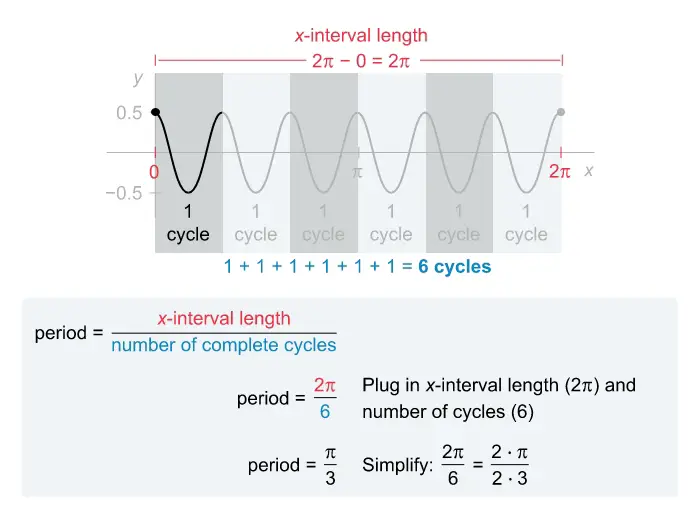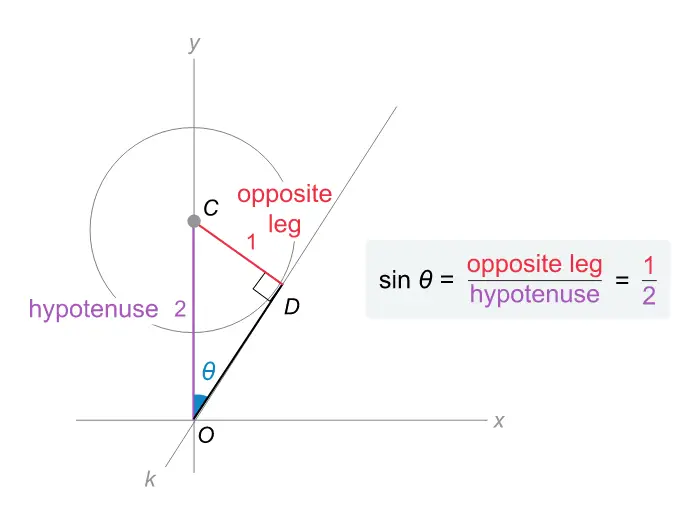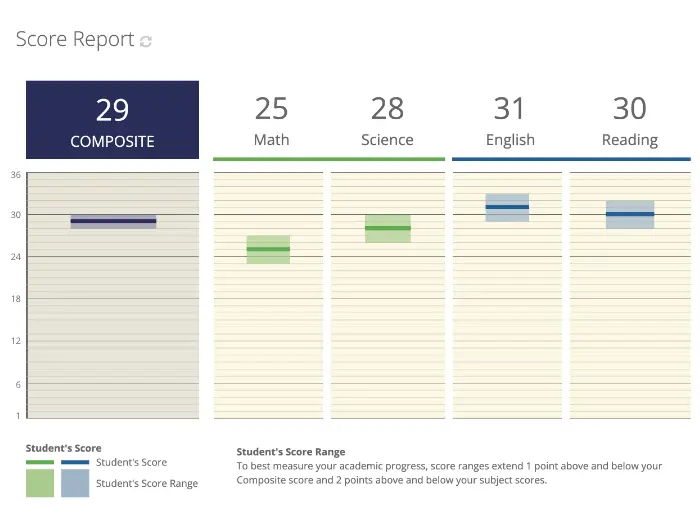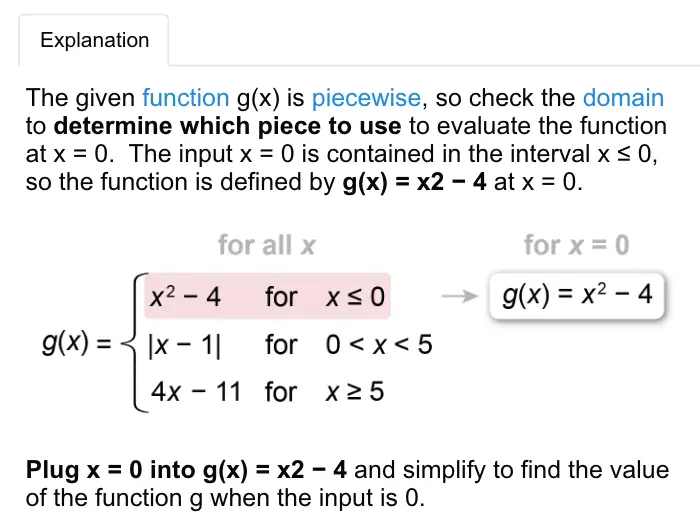About ACT® Math Test
ACT® Math is one of the four component tests of the ACT and contributes 25% to your final ACT score. If you are preparing for the upcoming ACT Math Test, it is crucial you nail this section to boost your total ACT score as much as possible. Our ACT Math guide will walk you through the format, topics, and question types you can expect on the test so you can plan your test prep schedule efficiently and earn a high ACT Math score.
ACT Math Format and Topics
The ACT Math Test evaluates the mathematical skills you learned in your high school math courses up to the start of grade 12. The test runs for 60 minutes during which you have to answer 60 multiple-choice questions (MCQs), giving you just 1 minute to answer each question.
You will get a mix of self-contained and set-based questions, meaning some questions are standalone, while other questions come in a set pertaining to a single graph, chart, or information. While the ACT Math section does not provide you with a formula sheet at the time of the test, you are allowed to use your calculator throughout the test.
Let us help with your test prep and make the hardest questions easier to answer.
What is tested on the ACT Math section?
The test material covers the below essential topics for introductory math courses in college; and, therefore, you will be required to have a thorough knowledge of basic ACT mathematical formulas as well as computational skills. Based on the topics and concepts tested, there are seven broad categories of questions on the ACT Math Test:
| Topics | No. of questions | |
|---|---|---|
| Integrating Essential Skills | 24 – 26 | |
| Modeling | 15 | |
| Algebra | 7–9 | |
| Functions | 7–9 | |
| Geometry | 7–9 | |
| Statistics and Probability | 4–7 | |
| Number and Quantity | 4–6 | |
Now, let’s understand the categories under which the ACT Math Test evaluates you:
- Preparing for Higher Math: Topics and concepts involving algebra, geometry and trigonometry.
- Integrating Essential Skills: Your skills in solving complex mathematical problems using topics, concepts, and formulas.
- Modeling: Your ability to understand, produce, interpret, evaluate, and improve models across a variety of mathematical topics.
By prioritizing your studying and practice work based on how heavily the question types appear in the exam, you can allocate your time to the material efficiently. Now, let’s take a look at which topics are more common than others on the ACT Math Test:
Integrating Essential Skills
There will be a total of 24–26 questions to evaluate your basic mathematical skills on the ACT Math test. These questions will focus on elementary topics that you would’ve covered in high school. Some of the skills tested are rates and percentages, proportional relationships, surface area and volume, and averages and medians. These question types are the most common on the ACT Math test.
Modeling
There will be a total of 15 or more of these questions on the ACT Math test. Modeling questions make up more than a quarter of the Math test, and according to ACT.org, these questions assess your skills in creating, understanding, and evaluating models, and correcting them if required. These models pertain to any of the topics covered in the Math section.
Algebra
There will be a total of 7–9 of these questions on the ACT Math test. To do well with these questions, you will need to understand different types of equations such as linear, exponential, radical, and polynomial expressions.
Functions
There will be a total of 7–9 of these questions on the ACT Math test. Your ability to define functions, write in function notation, apply functions, and represent functions in various forms is necessary to solve these questions. You will likely have to translate different kinds of functions and evaluate relationships in graphs.
Geometry
There will be a total of 7–9 of these questions on the ACT Math test. ACT.org states that these questions require skills in assessing the composition of shapes and an ability to define relationships. You can also expect some of these questions to ask you to solve for surface area, volume, or missing values.
Statistics and Probability
There will be a total of 4–7 of these questions on the ACT Math test. These questions test your skills in assessing sampling methods and relationships in data. Expect to find the measure of center and pinpoint relationships (like the spread of distribution in the data). You can also expect to find probabilities in these questions.
Number and Quantity
There will be a total of 4–6 of these questions on the ACT Math test. To do well on these questions, you will need to study and practice working with various numerical forms. According to ACT.org, these questions include real numbers, complex numbers, integer numbers, rational exponents, vectors, and matrices. Note that this is the least commonly tested topic in the ACT Math exam.
Our guide to the ACT Syllabus will help you learn more about each assessment category tested on the ACT Math section.
Is ACT Math Hard?
As we have mentioned above, you get one minute per question on the ACT Math Test, so you have to focus on sharpening your time management skills. While there is no definitive way to answer whether ACT Math is hard or easy, looking at the ACT Math scores from the past three years (2020-22) can give you an idea of how challenging it might be.
The table below lists the total number of students who took the ACT between 2020 and 2022, along with the percentage of students who earned a perfect score in ACT Math, and also the percentage of students who met the college readiness benchmark set by ACT.
| Year | Total Students | Avg. ACT Math score |
Students who scored a 36 | % of students who met the College Readiness benchmark |
|
|---|---|---|---|---|---|
| Number | % age | ||||
| 2022 | 1,349,644 | 19.3 | 4,807 | 0.35 % | 31 |
| 2021 | 1,295,349 | 19.9 | 5,045 | 0.38 % | 36 |
| 2020 | 1,670,497 | 20.2 | 7,476 | 0.44% | 37 |
As you can see, the average ACT Math score has declined over the past three years, which may indicate that ACT Math has gotten progressively harder to ace. There’s also been a steady decline in the number of students who scored a 36 on ACT Math, and also those who could meet the college readiness benchmark.
But worry not, we’ve got you covered! You can ace the ACT Math Test with a dedicated study schedule and by taking regular practice tests. Also, invest time to build a strong foundation of core math topics and concepts. With repeated practice, you may be able to predict which skill is being assessed and get better at your time management skills.
Does the Math section on the ACT get progressively harder?
Yes. Unlike the ACT English Test, questions become progressively harder towards the end of the math section. Usually, questions 1 - 20 are easier than questions 40 - 60. Since time is so important on ACT Math, try to spend less time on the questions at the beginning of the section so you have more time for the harder questions at the end.
Is ACT Math harder than SAT Math?
The simple answer is, it depends on what your skills and academic strengths and weaknesses are. Both the ACT Math and SAT Math test you on similar topics that include trigonometry, algebra, and arithmetic. However, the test format and question type for these tests are different, and that may impact your success on the SAT or the ACT. Below are three key factors that can determine whether one test is harder than the other :
-
Test syllabus
The ACT Math section covers a broader range of topics, including trigonometry and matrices, while the SAT Math section tends to focus more heavily on algebra and problem-solving skills.
-
Time per question
ACT Math has more questions than SAT Math. This gives you less than 60 seconds per question (to read and solve) on ACT Math, while you get about 82 seconds per question on SAT Math. This could be a factor for you if you struggle with time management.
-
Question type
The ACT Math section consists of MCQs, while the SAT Math section comprises both MCQs and Grid-ins. If you have difficulty with answering long-form questions that require you to show the process, taking the ACT Math could be a better option for you.
-
Calculator usage
ACT Math allows you to use a calculator throughout the test, while the current paper-and-pencil SAT allows calculator usage only during the “no calculator” part. Although this rule will be void with the upcoming Digital SAT effective 2024, if you are taking these tests in 2023, calculator usage could be a determining factor to your test performance.
These being said, both tests are designed to measure a student's proficiency in math and require a similar level of knowledge and problem-solving ability. Ultimately, the best way to determine which test may be a better fit for you is to take practice tests for both and compare your performance and comfort level.
Practice with difficult questions so the real exam feels easy.
How to Calculate ACT Math Score?
Your ACT Math score is calculated on a scale of 1 - 36. This scaled score is derived after calculating the raw score based on the total number of questions you answered correctly. After calculating your scaled Math Test score, it is added to your English, Reading, and Science Test scores and averaged (divided by 4) to determine your final ACT score.
Our ACT scoring guide is here to help you learn more about how the ACT Math Test is scored.
What is the passing score for the ACT Math section?
There is no passing score for the ACT or ACT Math. However, the ACT has established a college readiness benchmark that indicates the minimum test scores required for students to have a reasonable chance of succeeding in college. Earning a score above the benchmark increases your chances of getting into college.
What is a good ACT Math score?
A score above the college readiness benchmark set by the ACT is considered a good ACT Math score. To learn more, check out our blog on What is a good ACT score.
What is the average ACT Math score?
The average ACT Math score for the past four years (2019-22) has been 19.8.
What is a bad ACT Math score?
Any score that is recorded below the college readiness benchmark set by the ACT is considered a poor ACT Math score.
ACT Math Review Tips
When it comes to performing well on the ACT Math section, you can set yourself up for success with a plan to effectively manage time, master the fundamentals, and reinforce those with repeated practice. Here are a few review tips to give you a head start:
-
Time Management
There are 60 questions and only 60 minutes in which to complete them, leaving you with 1 minute per question. With so little time to study the problems and solve them, you don’t have time to second-guess or check your answers. Taking repeated practice tests will help you develop the necessary time management skills to complete the section in the allotted time.
-
Master the Fundamentals
You’ll be tested on your knowledge of mathematical concepts, analyzing and problem-solving skills. Mastering the fundamentals is the key to acing the ACT Math section.
-
Practice Makes Perfect
You’ve heard us say it before, but practicing for any timed test is the key to succeeding in it. Taking repeated practice tests will improve how you effectively manage time during a timed test and perform accurately under pressure.
Be sure to streamline your studies using UWorld’s ACT Prep Course, which offers performance tracking tools, detailed answer explanations, and thousands of sample questions. You can use the performance tracking tools to pinpoint weak areas throughout your practice work. You can also take advantage of the detailed answer explanations to dive deeper into the topics you struggle with. Preparing for the Math section will take lots of practice, so use these study tools to maximize your study plan and reach your full scoring potential!
Start practicing with our thousands of high-quality ACT questions and in-depth explanations.
Frequently Answered Questions (FAQs)
Can you use a calculator on the ACT Math Test?
Can you use a graphing calculator on the ACT Math section?
Yes, you can use a graphing calculator on ACT Math as long as its model and make are accepted by ACT’s calculator policy.
Is a low ACT Math score bad for an interest in Engineering?
A low ACT Math and STEM score can reduce your chances of getting into an engineering college and obtaining scholarships. However, you can always retake the ACT and improve your score.



